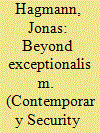|
|
|
Sort Order |
|
|
|
Items / Page
|
|
|
|
|
|
|
| Srl | Item |
| 1 |
ID:
098389


|
|
|
|
|
| Publication |
2010.
|
| Summary/Abstract |
Switzerland's traditional, military-centred and isolationist Cold War policies began to be vehemently contested in the 1990s. However, since the early 2000s, debates on security policy and foreign affairs have gradually lost public salience, and recent popular votes suggest increasingly consistent support both for a broader conception of national security and a more internationalist interpretation of neutrality. Have Switzerland's traditional policy frameworks thus been overcome? Investigating elite positions, this article argues that indeed, conventional disputes between military and civilian understandings of security have been transcended recently, as Swiss policy-makers settled for a remarkably broad and non-traditional conception of national security. At the same time, the article also argues, the perception of increasingly global security challenges has started to provide powerful rationales against traditional Swiss isolationism. By showing the processes through which Swiss security conceptions have been reformulated into a new dominant elite agreement, the article points out how Switzerland has slowly come to embrace security in European terms - not least also thanks to its new focus on non-traditional security agendas.
|
|
|
|
|
|
|
|
|
|
|
|
|
|
|
|
| 2 |
ID:
110837


|
|
|
|
|
| Publication |
2012.
|
| Summary/Abstract |
Aiming at the measurement, comparison and ranking of all kinds of public dangers, ranging from natural hazards to industrial risks and political perils, the preparation of national risk registers stands out as a novel and increasingly popular Western security practice. This article focuses on these registers and the analytical power politics in which they are complicit. We argue, first, that positing science as an objective determinant of security truth, national risk registers advance a modernist understanding of how knowledge of national dangers can be arrived at, discounting both sovereign and popular authorities; second, that by operationalizing a traditional risk-assessment formula, risk registers make possible seemingly apolitical decisions in security matters, taken on the basis of cost-benefit thinking; and, third, that risk registers' focus on risk 'themes' tiptoes around the definition of referent objects, avoiding overt decisions about the beneficiaries of particular security decisions. Taking all these factors into account, we find that risk registers 'depoliticize' national security debates while transforming national insecurity into something permanent and inevitable.
|
|
|
|
|
|
|
|
|
|
|
|
|
|
|
|
| 3 |
ID:
157073


|
|
|
|
|
| Summary/Abstract |
In the view of some Deleuzian scholars, societal steering evolved from analogue disciplining of static enclosures into network-centric, privatized, digital, and global control. This article re-engages the control thesis from a decidedly empirical security studies perspective. In the age of globalization and urbanization, technological innovation and liberal policy ideals, how are security apparatuses reorganized, and in what relations do they stand to local societal and political orders? The article argues that the Deleuzian framework indeed proposes an impressively rich, integrative, and topical research agenda—but also that its security studies applications can benefit from further development. With a view to vindicating its analytical potential, the article first systematizes the control thesis. It then employs a spatial and empirical heuristic to inquire into the securing of three distinct urban spaces—a site of mobility, a public square, and a place of mass commerce—and to illustrate the actual (re-)configuration of contemporary security management. Forgoing articulation of universalisms about societal steering, the article makes the case for more nuanced engagements with security ensembles, their technological evolution, and their relations with democratic ideals, globalization, and de-territorialization, both in and beyond Western polities.
|
|
|
|
|
|
|
|
|
|
|
|
|
|
|
|
|
|
|
|
|